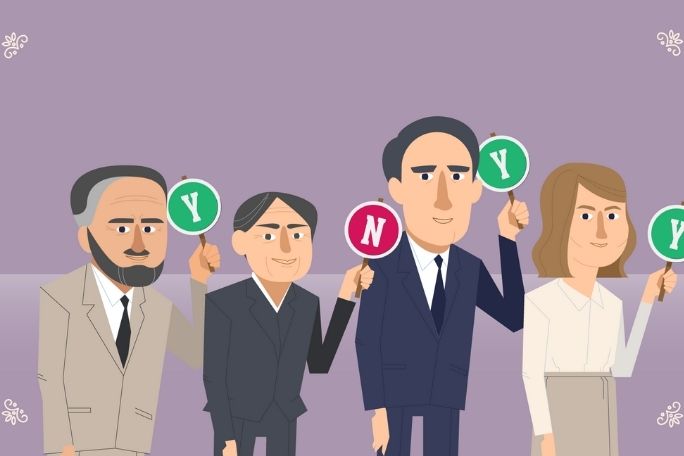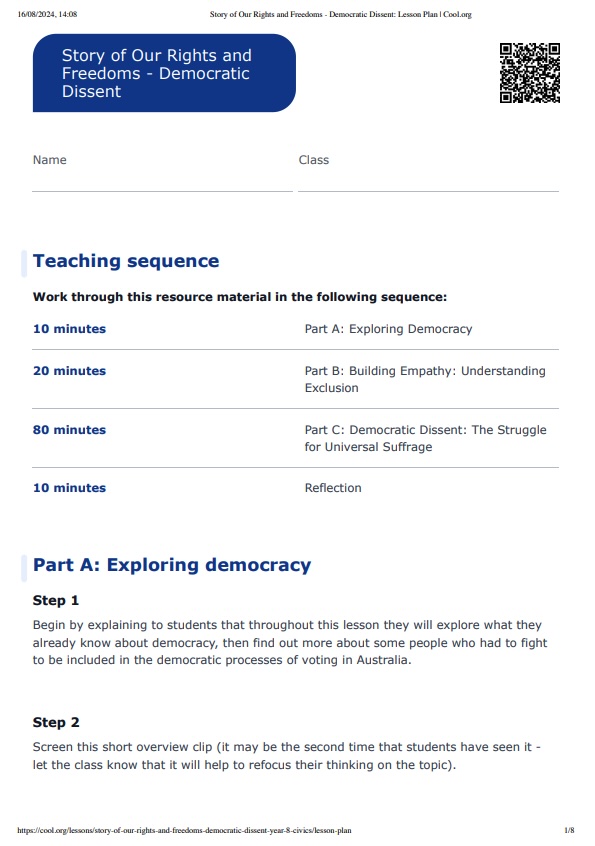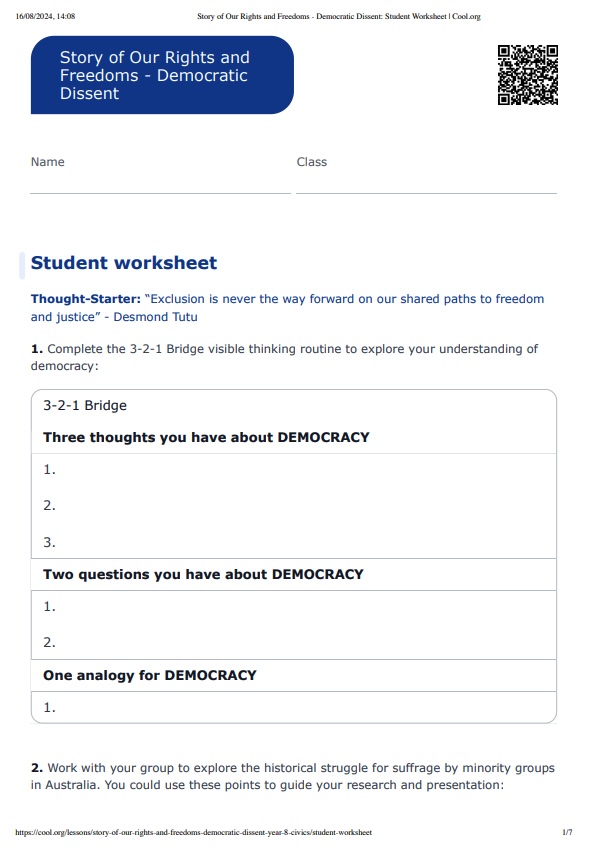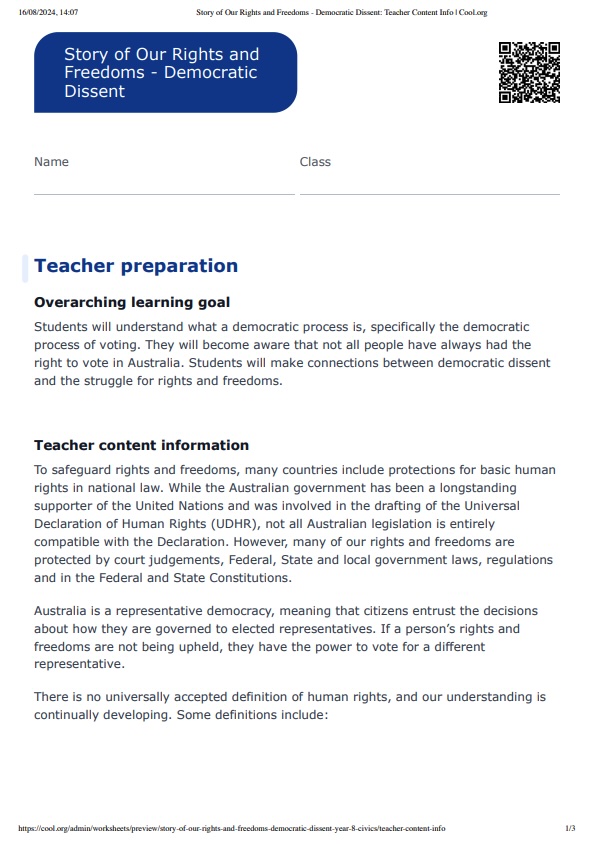Lesson summary
In this finding out lesson, students will watch a short video overviewing the concept of democracy, then outline their current understanding of democracy by completing the 3-2-1 Bridge visible thinking routine. In a role play class vote, students will consider the democratic right to vote, and what it feels like to be excluded from it. They will then work in groups to conduct in-depth research into two groups that struggled for the right to vote in Australia: Aboriginal and Torres Strait Islander peoples and women. Students will present their findings to their peers, and connect the actions of these groups to the concept of democratic dissent.
Essential questions:
- What is a democratic process?
- How do democratic processes link to our rights and freedoms?
- Who has the right to vote?
- What is democratic dissent?
Lesson guides and printables
Curriculum links
Select your curriculum from the options below.
Lesson details
Skills
This lesson is designed to build students’ competencies in the following skills:
- collaboration
- communication
- empathy
Curriculum mapping
(V9) Australian Curriculum content descriptions:
Year 8 Civics and Citizenship:
- How Australians are informed about and participate in democracy (AC9HC8K01)
- Different experiences of, perspectives on and debates about Australia’s national identity and citizenship, including the perspectives of First Nations Australians as owners of their respective nations, and of different migrant groups (AC9HC8K06)
- Analyse information, data and ideas about political or legal issues to identify and explain differences in perspectives and potential challenges (AC9HC8S03)
- Create descriptions, explanations and arguments using civics and citizenship knowledge, concepts and terms that reference evidence (AC9HC8S05)
General capabilities: Literacy, Critical and Creative Thinking, Intercultural Understanding, Ethical Understanding.
Cross-curriculum priority: Aboriginal and Torres Strait Islander histories and cultures.
Relevant parts of year 8 achievement standards: Students explain how Australians are informed about and participate in their democracy. They identify ways in which Australians express different aspects of their identity and explain perspectives on Australia’s national identity. Students analyse information and identify and describe perspectives and challenges related to political, legal or civic issues. They use civics and citizenship knowledge, concepts, terms and references to evidence from sources to create descriptions, explanations and arguments.
Unit of work: Story of Our Rights and Freedoms – Human Rights and Democracy
Time required: 120 mins.
Level of teacher scaffolding: Low – present some brief scenarios to the class and pose some reflective questions.
Resources required
- Student Worksheet – one copy per student
- Device capable of presenting a video and webpage to the class
- Women and the Right to Vote Factsheet (enough for half of the class)
- Aboriginal and Torres Strait Islander People and the Right to Vote Factsheet (enough for half of the class)
- Web enabled devices (enough for one per pair)
Additional info
Throughout the Story of Our Rights and Freedoms lessons, students will consider Civics and Citizenship concepts through a human rights lens. They will critically assess the Australian system of government and the effect that it has on our rights and freedoms.
There is no universally accepted definition of human rights, and our understanding is continually developing. Some definitions include:
- The recognition and respect of peoples’ dignity
- A set of moral and legal guidelines that promote and protect the recognition of our values, our identity and access to an adequate standard of living
- The basic standards by which we can identify and measure inequality and fairness
- Those rights associated with the Universal Declaration of Human Rights (UDHR)
When we talk about human rights we usually refer to principles that have been agreed upon by countries throughout the world. These rights have been set down in international agreements and form part of international law. They can also be written into the domestic law of individual countries. Human rights cover virtually every area of human life and activity. These include:
- Civil and political rights, such as freedom of speech and freedom from torture
- Economic and social rights, such as the rights to health and education
- Individual rights, including the right to a fair trial
- Collective rights, or those rights that apply to groups of people, such as the right to a healthy environment or to live on one’s ancestral land.
The UDHR is an international document that recognises the basic rights and fundamental freedoms to which all human beings are entitled. It was adopted by the United Nations General Assembly on 10 December 1948 and marks a key milestone in the history of human rights. The Magna Carta, though limited in who it protected, was an important precursor to the UDHR.
Click here to watch a video about the Magna Carta.
You can view the entire text of the Universal Declaration of Human Rights, and the other core international human rights treaties, on the United Nation’s website or by downloading RightsApp (free from the iTunes App store).




Welcome back!
Don't have an account yet?
Log in with:
Create your free Cool.org account.
Many of our resources are free, with an option to upgrade to Cool+ for premium content.
Already have an account?
Sign up with:
By signing up you accept Cool.org's Terms and Conditions(Opens in new tab) and Privacy Policy(Opens in new tab).